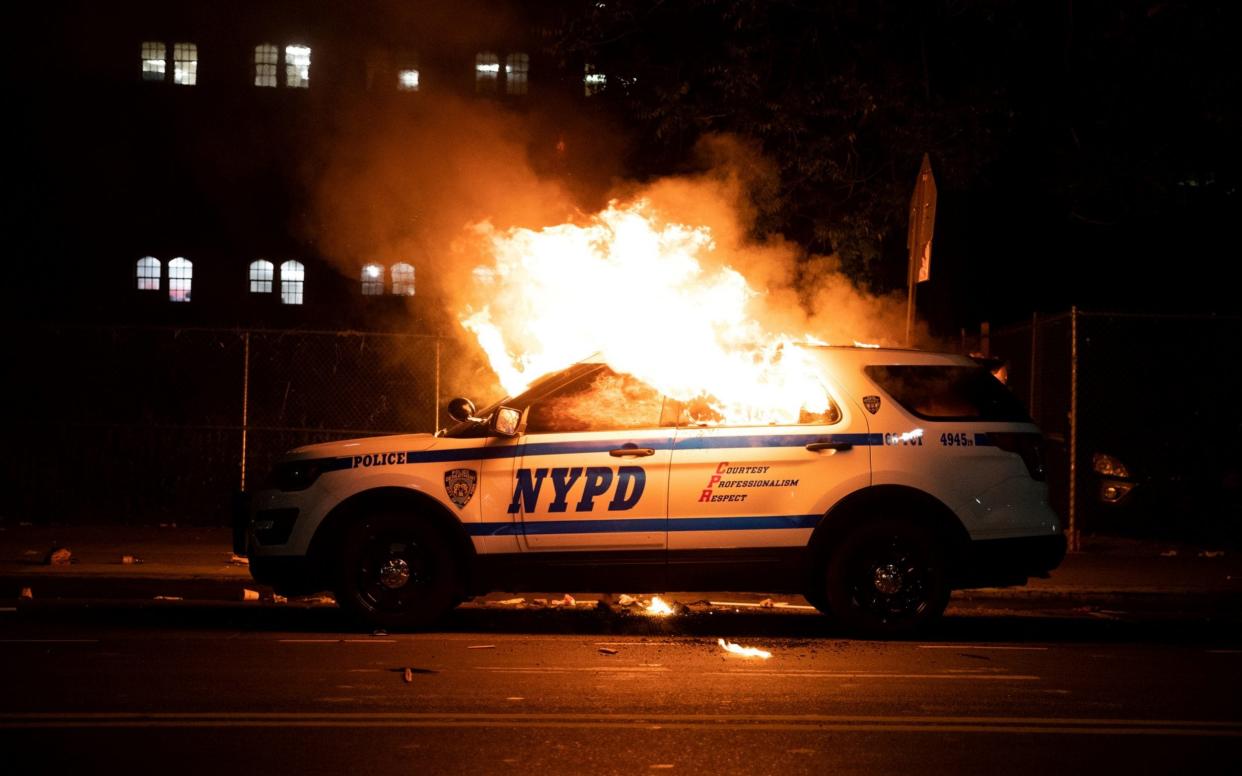Looting in the wake of a brutal murder provokes yet more injustice in America

The arrest of George Floyd was brutal and shameless. No one disagrees with that; it’s a rare point of American consensus. We’ve got the footage of a policeman, Derek Chauvin, kneeling on Floyd’s neck for more than eight minutes, during which Floyd can be heard saying “I can’t breathe”. Even after his pulse stopped, even when he was presumably dead, Chauvin wouldn’t remove his knee.
President Trump called the incident “terrible” and pushed for a federal investigation. Chauvin was sacked within 24 hours, arrested and charged within a week. His wife has begun divorce proceedings. Protests erupted in Minneapolis and spread across the nation – rightly and justly, because this horror had to be called out. In a sense, democracy was responding exactly the way it should. Nothing justified a riot.
Citizens have been attacked, stoned, spat at, shot at, had urine thrown at them and their property looted and burned. Some of the riots are a shopping trip. The most striking scene was a Target store overrun in Minnesota, where people jogged the aisles, trolleys piled high with stolen goods, as if competing in Supermarket Sweep. There’s a photo of one white kid marching out of the store with a fully dressed mannequin under his arm.
The riots have been as brutal and shameless as the death that triggered them. All the mayors agree on that; all of them Democrats. Atlanta: “This is not the spirit of Martin Luther King Jnr. This is chaos.” Portland: “What’s going on right now is flat out breaking the law.” The governor of Minnesota claimed that “the vast majority” of those causing trouble come from outside his state – organised via “the dark web” – echoing statements by the mayors of New York and Detroit, where, in one night, more than half the people arrested weren’t from Detroit and a significant number in a city that is 80 per cent black were white. Who were they? Far-Right thugs? Far-Left troublemakers? Either way, black leaders have started to ask the white visitors to go away – because it’s their communities that have become a battleground, their streets that will have to be cleaned up in the morning.
Riots add one more injustice to another. The unheard voice isn’t the cop, the president, the mayor or the professional agitator, it’s the man whose shop has been vandalised to protest an outrage that he had nothing to do with. Of course, he was probably bankrupt already, his business having been shuttered for several weeks by government order, and you can bet your life that if he had opened it, a cop would’ve shown up with sirens blazing to order him to close. Yet when a criminal burns that same store to the ground, the police stand back and watch it happen. There is order for the law-abiding; freedom for the anarchist.
Everyone is against police brutality; everyone is against riots. So why do they happen? Because America has a racism problem, oh yes, but also a confrontation problem. Things escalate too fast. Do you know what George Floyd was accused of doing that earned him this SAS-style arrest? He used a counterfeit bill to buy a pack of cigarettes. If true, he probably didn’t even know it was forged.
To Wales and beyond
While much of America was on fire, the SpaceX Falcon 9 rocket took off from Cape Canaveral. There’s always something thrilling about watching a rocket launch, although I’m sad to see that knobs and switches have given way to boring touchscreen computers in the capsule. The future doesn’t look so futury as it did in the past.
Where would you rather be, down here or up there? We are led to believe – by the politicians and those awful adverts for McCain oven chips – that we are a nation of heroes because we’ve done sweet Fanny Adams for 10 weeks, and Covid-19 has brought us all together. Well, when the lockdown is finally over, I intend to get as far away from you all as I possibly can. I can’t afford the Moon, but Wales will suffice.
The social experience of the lockdown has been claustrophobic. Action was necessary, but it’s taught us what governments can and will do; how it can be enforced, and how happily the public will comply. As the lockdown eases, unity erodes. We’re back to partisan politics, which is what the Cummings row was really about (no one made that much of a fuss when Stephen Kinnock was accused of breaking the rules), and it’s funny how ministers who seemed so “statesmanlike” a few weeks ago look very different now that we’re counting the dead and staring unemployment in the face. I noticed for the first time last week that the Chancellor of the exchequer has a lisp.
Let’s stop pretending that “everything has changed”. The threat of catching Covid-19 did not stop a riot in the United States and it won’t alter the rules of politics in Britain. As for the state of my hair, thank you for asking, it is now the size and proportions of a regency wig. The other day, a bee got stuck in it and I had to talk him out. Anyone listening over the garden wall must have thought I was insane: “Go forward… go back… I don’t know why you’re getting angry with me – blame Boris Johnson!”

 Yahoo News
Yahoo News 
